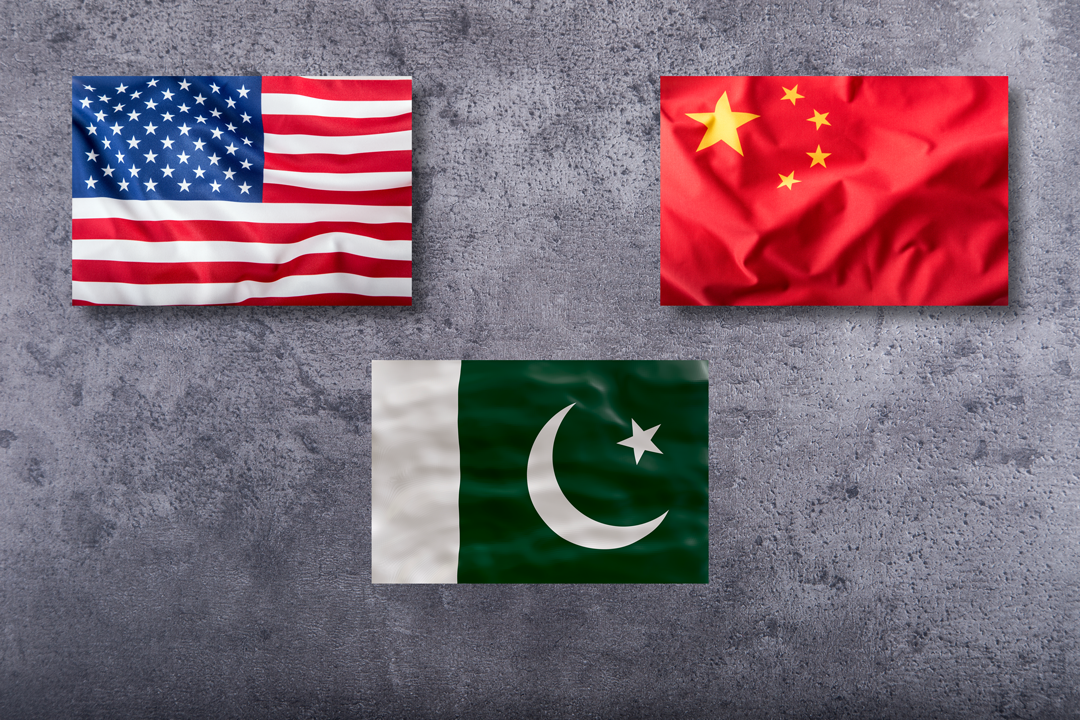 As the strategic competition between the U.S. and China intensifies, the echoes of Cold War 2.0 and camp politics get louder. While third-world countries are finding it difficult to navigate the great power politics, Pakistan, in particular, is experiencing intensified disruptive geopolitical forces. Irrespective of all the gloom and doom scenario, Pakistan can still play a constructive role by providing an avenue for cooperation between the two great powers. Notwithstanding the current spat over Pakistan’s debt crisis, counterterrorism can be an area of positive engagement between the U.S. and China.
As the strategic competition between the U.S. and China intensifies, the echoes of Cold War 2.0 and camp politics get louder. While third-world countries are finding it difficult to navigate the great power politics, Pakistan, in particular, is experiencing intensified disruptive geopolitical forces. Irrespective of all the gloom and doom scenario, Pakistan can still play a constructive role by providing an avenue for cooperation between the two great powers. Notwithstanding the current spat over Pakistan’s debt crisis, counterterrorism can be an area of positive engagement between the U.S. and China.
The shared concerns regarding terrorist threats between the U.S., Pakistan, and China have resulted in Pakistan-U.S. and Pakistan-China bilateral security dialogues. To mitigate the common threats, there is a need for a tripartite security dialogue between Pakistan, the U.S., and China, with Pakistan acting as Ground Zero.
Shared Terrorist Threats
All three countries share the common threat of terrorism emanating from Al-Qaeda, Tehrik-i-Taliban Pakistan (TTP), Islamic State “Khorasan” (ISKP), Baloch Liberation Army (BLA), and East Turkestan Islamic Movement (ETIM) along with other terrorist organizations operating within Afghanistan.
Since the Taliban takeover, the number of terrorist attacks in Pakistan has increased manifold. According to a report by the Pakistan Institute of Parliamentary Studies (PIPS), there was an 84 percent increase in terrorist attacks within the country in 2022 as compared to 2020. Another report published by the Pakistan Institute of Conflict and Security Studies (PICSS) highlighted that January 2023 was the deadliest month since 2018.
For China, the first and foremost terrorist threat is the presence of safe havens of ETIM within Afghanistan. Despite the organization being delisted from the U.S. terror list, China continues to designate it as a critical threat to the security in the restive Xinjiang region. Meanwhile, ETIM presents a direct domestic terrorist threat, while TTP and BLA pose indirect threats to Chinese interests within the region, especially to infrastructure within Pakistan under the China-Pakistan Economic Corridor (CPEC).
In a joint statement by the U.S. Department of State, concerns were raised regarding the activities of Al-Qaeda, ISKP, and TTP within Afghanistan. The statement called on the Afghan Taliban interim government to uphold its obligations of ensuring its soil is not being used by terrorist outfits. It also highlighted that the failure in countering these threats would result in consequences having an impact beyond Afghan borders.
CENTCOM Commander, General Michael Kurilla also raised similar concerns highlighting the ability of ISKP in attacking U.S. citizens. According to a statement by Gen. Kurilla, ISKP within the next six months will be able to target U.S. citizens with little or no warning.
The security concerns of all three countries have resulted in various U.S.-Pakistan and China-Pakistan bilateral security dialogues and engagements.
U.S.-Pakistan Heads Up for Security Cooperation
On March 6, 2023, Pakistan and the U.S. held a counterterrorism dialogue in the wake of the recent surge in terrorist attacks within Pakistan. The two-day dialogue discussed border security and countering financing terrorism. Since the U.S. withdrawal from Afghanistan, Pakistan has faced an increased terrorist threat from TTP. The U.S. State Department spokesperson stated that the terrorist organization could also be a threat to the U.S. interests in the region.
On February 13, 2023, the two countries began the second round of Mid-level defense dialogue in Washington DC, hinting at renewing the bilateral cooperation. The first round of the dialogue was held in January 2021 in Pakistan. Defense and security concerns were discussed during the meeting to enhance bilateral cooperation on such matters. It was the first meaningful engagement between the two countries since the Afghanistan withdrawal, since when bilateral ties have been at their lowest ebb. However, U.S. State Department spokesperson, Ned Price on the sidelines of the defense dialogue maintained that “Pakistan is an important partner in a number of regards, an important counterterrorism partner.”
In September 2022, the Biden administration also approved a $450 million sustenance package for Pakistan’s F-16 fighter jet fleet. According to the state department spokesperson, the package will help Pakistan meet its current and future counterterrorism needs.
China-Pakistan Bilateral Engagements
On March 18, 2023, Pakistan and China held the third round of Pakistan-China Bilateral Political Consultations (BPC), which is a regular institutional mechanism at the foreign secretary/vice-ministerial level. The meeting concluded with an agreement on enhancing the entire spectrum of bilateral relations. On February 1, 2023, Chinese President Xi, while sending condolences to the victims of the Peshawar mosque attack, called for greater cooperation in the counterterrorism domain. Pakistan-China Strategic Dialogue is another bilateral security consultation agreement that happens at the ministerial level. The latest round of the strategic dialogue was held in 2021.
However, the continued attacks from BLA on the Chinese nationals and infrastructure projects under CPEC have seriously tested Pakistan-China bilateral cooperation. After a female suicide attacker killed the director of the Confucius Centre at Karachi University, along with two other Chinese nationals and their Pakistani driver, calls for Chinese personal security apparatus to protect assets in Pakistan gained momentum. Although the suggestions were declined by the Pakistani authorities, the security situation remains anathema for Pakistan to safeguard its all-weather strategic partnership with China.
The Need for Tripartite Counter-Terrorism Security Dialogue
The calls for such tripartite cooperation are not new. In a similar analysis, Furqan Khan, Assistant Research Associate at IPRI, highlighted the prospects for tripartite cooperation between the two competing great powers in Afghanistan. The shared goal of countering terrorism and its financing can help bridge the two countries while mitigating the risks of confrontation. The policy of cooperation with China on counterterrorism would also be aligned with the foreign policy of the Biden administration vis-à-vis China, which states, “Our relationship with China will be competitive when it should be, collaborative when it can be, and adversarial when it must be.”
There are several areas where the two competing great powers have cooperated to mitigate threats of global scale. From climate change, Covid-19, and North Korea to trade, both countries have either co-sponsored resolutions at the UN level or published a joint communique on working in unison to mitigate the threats. Counterterrorism could also be an avenue where both countries cooperate to understand the global threat level.
Pakistan can remain the key to such cooperation while being the ground zero in terms of ministerial-level dialogues and meetings. It has already hosted a troika-plus meeting on Afghanistan, which included China, Russia, and the U.S. The U.S. has already hinted at reviving post-9/11 counterterrorism initiatives with Pakistan, and China could chip in with the opportunity to extend its hand for tripartite cooperation on the issue.
Conclusion
The recent spike in terrorism within Pakistan has not only challenged the writ of the state but also highlighted the ability of terrorist organizations to use Afghan soil for global terrorist activities. With the U.S. and China both primary targets of various terrorist organizations in terms of infrastructure and citizens, the two competing great powers can join hands against the menace. Pakistan, being the primary target of TTP, can act as a bridge between the U.S. and China on counterterrorism, resulting in a troika framework or security dialogue. The troika-plus could be used as a blueprint for the aforementioned security dialogue or framework between the three countries while focusing solely on counterterrorism initiatives.
![]()




Be the first to comment